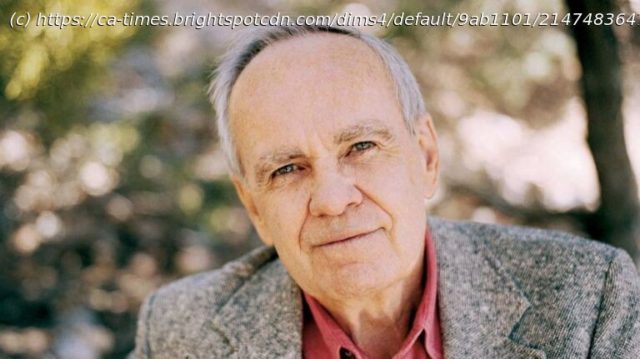xx
Cormac McCarthy, the acclaimed fiction writer whose books were regarded as American masterpieces by critics and legions of fans but who refused to offer insight into what had inspired them or what they might mean, has died.
Widely regarded as one of America’s greatest modern writers, McCarthy died on Tuesday of natural causes at his home in Santa Fe, N.M., according to his publisher, Knopf. He was 89.
Often set in the backwoods of Tennessee or the great wide open of the Old West, McCarthy’s novels took violence to a nearly hallucinogenic level as he spooled out stories of murderous bounty hunters, drug deals gone fatally wrong and life in a post-apocalyptic netherworld.
His work — especially his early novels set in the South — was sometimes compared to that of William Faulkner or Flannery O’Connor. During the course of his career, he won virtually every meaningful award, including a Pulitzer Prize.
While his early novels won praise from critics, they also sold poorly. But his standing in the literary world soared with the 1992 publication of “All the Pretty Horses,” the first book in what came to be known as the Border Trilogy.
His 2005 novel ”No Country for Old Men” was adapted into a screenplay for the Coen brothers’ movie of the same name, which won the Academy Award for best picture. And “The Road,” an allegorical tale of a father and son wandering through the gray gloom following an unexplained cataclysm, won the Pultizer Prize for fiction in 2007.
But it is the cinematic, ultra-graphic “Blood Meridian,” a full-throttled story of violence as a team of bounty hunters sweep across the Texas-Mexico borderlands to cash in on a government offer to pay $100 for every Native American scalp they can collect, that is regarded as McCarthy’s masterpiece. Some critics hailed it as one of the great American novels.
In a 2005 review, The Times described “Blood Meridian” as perhaps the most “violent and graphic book in American literature.” Yet it succeeds, the review concluded, as a cautionary tale about humankind confronting an existence that is somehow beyond good and evil.
McCarthy had a strong aversion to punctuation, and often stripped his books of quotation marks, commas and hyphens. He found the semicolon to be particularly loathsome — “weird little marks that block up the page.” While some purists complained, many critics found his writing so seductive and self-propelled that readers would instinctively know what was a quote or when a sentence came to an end.
He was also steadfastly private, not in the reclusive manner of J.D. Sallinger or Thomas Pynchon, but more along the lines of Bob Dylan, who preferred to let his printed words speak for themselves.
McCarthy refused to go on book tours, granted few interviews and turned down handsome honorariums on the lecture circuit. He was dismissive of many of his literary contemporaries and preferred the company of the scientists and deep-thinkers he met at the Santa Fe Institute, the New Mexico think tank where he frequently wrote.
When a reporter from the London Telegraph finally tracked down McCarthy eating dinner at a Lubys diner in Texas, hoping for an interview, McCarthy slowly folded the newspaper he had been reading and answered politely, but firmly.
“I’m sorry, son, but you’re asking me to do something I just can’t possibly do.”
McCarthy did agree to talk with Oprah Winfrey in 2007 in what would be his first and only television interview , a concession he made when she added “The Road” to her book club list and proclaimed him “America’s greatest living writer.”
Dressed crisply and looking like a college professor, McCarthy was both funny and self-deprecating.
Start
United States
USA — Science Cormac McCarthy, author of ‘No Country for Old Men’ and ‘Blood Meridian,’...






